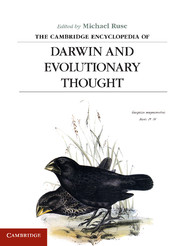Book contents
- Frontmatter
- Contents
- Contributors
- Preface
- Acknowledgments
- Introduction
- 1 Origins and the Greeks
- 2 Evolution before Darwin
- 3 Charles Darwin’s Geology
- 4 Looking Back with “Great Satisfaction” on Charles Darwin’s Vertebrate Paleontology
- 5 The Origins of the Origin
- 6 Darwin and Taxonomy
- 7 Darwin and the Barnacles
- 8 The Analogy between Artificial and Natural Selection
- 9 The Origin of Species
- 10 Sexual Selection
- 11 Darwin and Species
- 12 Darwin and Heredity
- 13 Darwin and Time
- 14 Darwin’s Evolutionary Botany
- 15 Mimicry and Camouflage
- 16 Chance and Design
- 17 Darwin and Teleology
- 18 The Evolution of the Origin (1859–1872)
- 19 Alfred Russel Wallace
- 20 Darwin and Humans
- 21 Darwin and Language
- 22 Darwin and Ethics
- 23 Social Darwinism
- 24 Darwin and the Levels of Selection
- 25 Darwin and Religion
- 26 Darwinism in Britain
- 27 Darwinism in the United States, 1859–1930
- 28 The German Reception of Darwin’s Theory, 1860–1945
- 29 Darwin and Darwinism in France before 1900
- 30 Encountering Darwin and Creating Darwinism in China
- 31 Darwinism in Latin America
- 32 Botany
- 33 Population Genetics
- 34 Synthesis Period in Evolutionary Studies
- 35 Ecological Genetics
- 36 Darwin and Darwinism in France after 1900
- 37 Botany and the Evolutionary Synthesis, 1920–1950
- 38 The Emergence of Life on Earth and the Darwinian Revolution
- 39 The Evolution of the Testing of Evolution
- 40 Mimicry and Camouflage
- 41 The Tree of Life
- 42 Sociobiology
- 43 Evolutionary Paleontology
- 44 Darwin and Geography
- 45 Darwin and the Finches
- 46 Developmental Evolution
- 47 Darwin’s Evolutionary Ecology
- 48 Darwin and the Environment
- 49 Molecular Biology
- 50 Challenging Darwinism
- 51 Human Evolution after Darwin
- 52 Language Evolution since Darwin
- 53 Cultural Evolution
- 54 Literature
- 55 Darwin and Gender
- 56 Evolutionary Epistemology
- 57 Ethics after Darwin
- 58 Darwin and Protestantism
- 59 Creationism
- 60 Darwin and Catholicism
- 61 Judaism, Jews, and Evolution
- 62 Religion
- 63 From Evolution and Medicine to Evolutionary Medicine
- Bibliography
- Index
52 - Language Evolution since Darwin
Published online by Cambridge University Press: 05 May 2013
- Frontmatter
- Contents
- Contributors
- Preface
- Acknowledgments
- Introduction
- 1 Origins and the Greeks
- 2 Evolution before Darwin
- 3 Charles Darwin’s Geology
- 4 Looking Back with “Great Satisfaction” on Charles Darwin’s Vertebrate Paleontology
- 5 The Origins of the Origin
- 6 Darwin and Taxonomy
- 7 Darwin and the Barnacles
- 8 The Analogy between Artificial and Natural Selection
- 9 The Origin of Species
- 10 Sexual Selection
- 11 Darwin and Species
- 12 Darwin and Heredity
- 13 Darwin and Time
- 14 Darwin’s Evolutionary Botany
- 15 Mimicry and Camouflage
- 16 Chance and Design
- 17 Darwin and Teleology
- 18 The Evolution of the Origin (1859–1872)
- 19 Alfred Russel Wallace
- 20 Darwin and Humans
- 21 Darwin and Language
- 22 Darwin and Ethics
- 23 Social Darwinism
- 24 Darwin and the Levels of Selection
- 25 Darwin and Religion
- 26 Darwinism in Britain
- 27 Darwinism in the United States, 1859–1930
- 28 The German Reception of Darwin’s Theory, 1860–1945
- 29 Darwin and Darwinism in France before 1900
- 30 Encountering Darwin and Creating Darwinism in China
- 31 Darwinism in Latin America
- 32 Botany
- 33 Population Genetics
- 34 Synthesis Period in Evolutionary Studies
- 35 Ecological Genetics
- 36 Darwin and Darwinism in France after 1900
- 37 Botany and the Evolutionary Synthesis, 1920–1950
- 38 The Emergence of Life on Earth and the Darwinian Revolution
- 39 The Evolution of the Testing of Evolution
- 40 Mimicry and Camouflage
- 41 The Tree of Life
- 42 Sociobiology
- 43 Evolutionary Paleontology
- 44 Darwin and Geography
- 45 Darwin and the Finches
- 46 Developmental Evolution
- 47 Darwin’s Evolutionary Ecology
- 48 Darwin and the Environment
- 49 Molecular Biology
- 50 Challenging Darwinism
- 51 Human Evolution after Darwin
- 52 Language Evolution since Darwin
- 53 Cultural Evolution
- 54 Literature
- 55 Darwin and Gender
- 56 Evolutionary Epistemology
- 57 Ethics after Darwin
- 58 Darwin and Protestantism
- 59 Creationism
- 60 Darwin and Catholicism
- 61 Judaism, Jews, and Evolution
- 62 Religion
- 63 From Evolution and Medicine to Evolutionary Medicine
- Bibliography
- Index
Summary
In England, the month of March 1838 brought with it an early-spring chill. At this time at the London Zoo, Jenny the orangutan was quartered inside the Giraffe House, a location heated to a degree appropriate for a tropical ape. Into Jenny’s cage one day walked a man, age twenty-nine and two years back home in England after participating in a naturalist’s dream, a five-year, seagoing scientific expedition during which he observed, studied, and collected specimens of the world’s fauna.
The man, of course, was Charles Darwin. Darwin was, on that spring day, twenty-one years away from publishing a book on evolution, and thirty-three years away from committing to paper his thoughts on human evolution (Zimmer 2007). He was already keenly curious, though, about behavior of nonhuman primates. Darwin “watched Jenny gaze at herself in a mirror. She used bits of straw like tools…. Others might believe they were vastly different from an orangutan, but Darwin didn’t.” In a letter to his sister, Darwin even concluded that Jenny “certainly understood every word” of the zookeeper’s language directed at her (Zimmer 2007, 5).
- Type
- Chapter
- Information
- The Cambridge Encyclopedia of Darwin and Evolutionary Thought , pp. 420 - 427Publisher: Cambridge University PressPrint publication year: 2013



